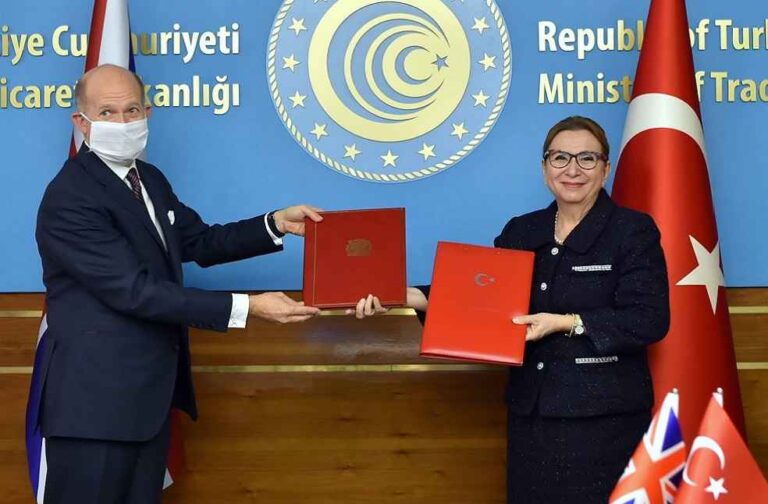Discussions have commenced for ‘UK-Turkey Forge New Trade Deal’, an initiative to establish an enhanced trade agreement between the United Kingdom and Turkey, with the intention of addressing a current shortcoming.
The existing arrangement overlooks the services sector, a vital component of both nations’ economies. The anticipated new agreement aims to rectify this by including these sectors. If successfully implemented, this comprehensive trade agreement could potentially fortify the economic alliance between the UK and Turkey.
Turkish and British officials have revealed that official talks have begun with the aim of revising and renewing the existing agreement. Since the United Kingdom left the European Union in 2020, the UK has been striving to deepen its ties with middle powers such as India, Singapore, and Turkey.

UK Investment Minister Dominic Johnson expressed optimism about the ongoing talks between the two countries. The focus is now on incorporating various sectors, including services and digital industries, into the agreement. “The UK’s current agreement, signed in December 2020, primarily covers goods. Expanding the agreement to encompass new areas such as services and digital industries could significantly benefit both economies,” Johnson informed the media.
Soner Cagaptay, Beyer Family Fellow and director of the Turkish research program at The Washington Institute, believes that the revised trade deal would be mutually beneficial. The post-Brexit Britain’s desire for global consolidation, coupled with Turkey’s economic growth ambitions, paints a promising picture for both nations.
The existing Turkey-UK Free Trade Agreement, formed post-Brexit, is patterned after the Turkey-EU Customs Union deal, focusing predominantly on manufactured goods and select agricultural products. Talks are now underway for a fresh agreement that will include services, a sector representing over 80% of the UK’s economy and 75% of Turkey’s. Given that the UK is the world’s second-largest exporter of services, the proposed trade agreement is expected to reduce the cost of goods and enhance consumer choice in Turkey.

However, this endeavor comes with challenges. Sinan Ulgen, senior fellow at Carnegie Europe in Brussels, emphasized the complexity of negotiating services liberalization. Assessing the inherent obstacles within differing regulatory regimes and deciding on their harmonization will not be a simple task. “It’s not an easy negotiation…the benefits are also likely to be much bigger both for Turkey and the UK,” he noted.
Experts believe that both sides are determined to complete the deal despite obstacles at the administrative level, geopolitics and trade and industry crises within the country. “Starting negotiations demonstrates political will, but ending them properly is key, starting is easier,” noted Ilke Toygur, a senior associate at the Center for Strategic and International Studies.

Naturally, negotiations will precede the implementation of the agreement, and the dedication demonstrated by both countries signals a hopeful future for their trading relationship. As Toygur highlights, “Managing services, digital and data is never a simple task, but they are undeniably essential for 21st-century economies”.
The UK and Turkey have both experienced significant shifts in their trading landscapes in the mere two years since Brexit. This has highlighted the necessity for a more robust, inclusive, and forward-thinking trade agreement between the two nations, one that surpasses the breadth and depth of the current arrangement. The ongoing discussions demonstrate both countries’ commitment to evolving their economies to meet modern demands, with a particular emphasis on Turkey. Turkey holds the conviction that the realization of this agreement would catalyze advancements in living conditions for its youth.
LOGISTICS INDUSTRY | Trade Turmoil: Labor Disputes and Drought Disrupt Global Shipping



